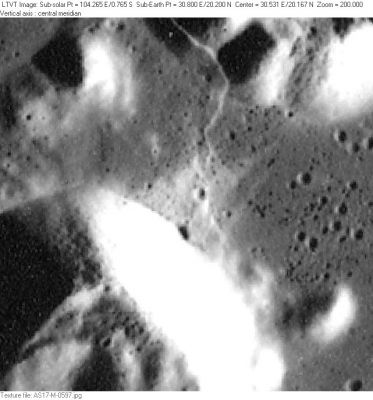Difference between revisions of "Scarp"
| (One intermediate revision by the same user not shown) | |||
| Line 6: | Line 6: | ||
|} | |} | ||
<div id="toc"> | <div id="toc"> | ||
| − | + | [http://www.lpod.org/coppermine/albums/userpics/Apollo_17_Light_Mantle_AS17-M-0597_LTVT.JPG [[Image:Normal_Apollo_17_Light_Mantle_AS17-M-0597_LTVT.JPG|external image normal_Apollo_17_Light_Mantle_AS17-M-0597_LTVT.JPG]]]<br /> ''[http://lpod.org/coppermine/displayimage.php?pos=-2266 AS17-M-0597]'' '''Scarp''' is the bright crack-like line running up the center of the frame from [http://the-moon.us/wiki/Light%20Mantle Light Mantle] in the south,then turning westward along the foothills of the [http://the-moon.us/wiki/North%20Massif North Massif] mountains. It extends for some distance beyond this to the north, continuing with a parallel branch.<br /> <br /> | |
| − | |||
==Images== | ==Images== | ||
[http://www.lpod.org/coppermine/thumbnails.php?album=search&type=full&search=Scarp LPOD Photo Gallery] [http://www.lpi.usra.edu/resources/lunar_orbiter/bin/srch_nam.shtml?Scarp%7C0 Lunar Orbiter Images] [http://www.lpi.usra.edu/resources/apollo/search/feature/?feature=Scarp Apollo Images] (the three photographs in the LPI's Apollo list of '''Scarp''' show the craterlet called '''Scarp''', once visited by the astronauts of Apollo 15 near '''Rima Hadley''').<br /> <br /> | [http://www.lpod.org/coppermine/thumbnails.php?album=search&type=full&search=Scarp LPOD Photo Gallery] [http://www.lpi.usra.edu/resources/lunar_orbiter/bin/srch_nam.shtml?Scarp%7C0 Lunar Orbiter Images] [http://www.lpi.usra.edu/resources/apollo/search/feature/?feature=Scarp Apollo Images] (the three photographs in the LPI's Apollo list of '''Scarp''' show the craterlet called '''Scarp''', once visited by the astronauts of Apollo 15 near '''Rima Hadley''').<br /> <br /> | ||
| Line 29: | Line 28: | ||
APOLLO OVER THE MOON; A VIEW FROM ORBIT, Chapter 4: The Maria ([http://www.hq.nasa.gov/office/pao/History/SP-362/ch4.3.htm Part 3]), Figures 80 and 81.<br /> <br /> | APOLLO OVER THE MOON; A VIEW FROM ORBIT, Chapter 4: The Maria ([http://www.hq.nasa.gov/office/pao/History/SP-362/ch4.3.htm Part 3]), Figures 80 and 81.<br /> <br /> | ||
---- | ---- | ||
| − | + | </div> | |
Latest revision as of 02:15, 16 April 2018
Contents
Scarp (aka Lee-Lincoln Scarp) (Apollo 17 site formation name)
|
Lat: 20.3°N, Long: 30.6°E, Diam: 8 km, Depth: km, Rükl: 25 |
AS17-M-0597 Scarp is the bright crack-like line running up the center of the frame from Light Mantle in the south,then turning westward along the foothills of the North Massif mountains. It extends for some distance beyond this to the north, continuing with a parallel branch.
Images
LPOD Photo Gallery Lunar Orbiter Images Apollo Images (the three photographs in the LPI's Apollo list of Scarp show the craterlet called Scarp, once visited by the astronauts of Apollo 15 near Rima Hadley).
Maps
(LAC zone 43D1) LAC map Geologic map LTO map
IAU page
Description
Dedicated observers of the moon could detect Apollo 17's Scarp through common and powerful telescopes (with or without an attached Hi-Res webcam).
Description: Wikipedia
Additional Information
The Landing Site Name "Scarp" is plotted on Topophotomap 43D1/S1 and Site Traverses chart 43D1S2.
Nomenclature
- "Astronaut-assigned" minor feature name, Apollo 17 site, approved in IAU Transactions XVIB(1976).
- The northern part of the scarp was unofficially called the Lincoln scarp, and the southern part Lee scarp. The whole scarp was also called the Lincoln-Lee scarp or Lee-Lincoln Scarp.
- According to Harrison Schmitt those names honored Abraham Lincoln (1809-1865) and Robert E. Lee (1807–1870). The IAU nomenclature does not normally allow lunar features to be named after political or military figures.
- It is unclear how much of the length of the scarp the Landing Site Name is meant to apply to.
LROC Articles
The Moon in 3D by Eric Eliason (contains blue-red anaglyphs of the Lee-Lincoln Scarp, officially known as Scarp).
Bibliography
APOLLO OVER THE MOON; A VIEW FROM ORBIT, Chapter 4: The Maria (Part 3), Figures 80 and 81.
